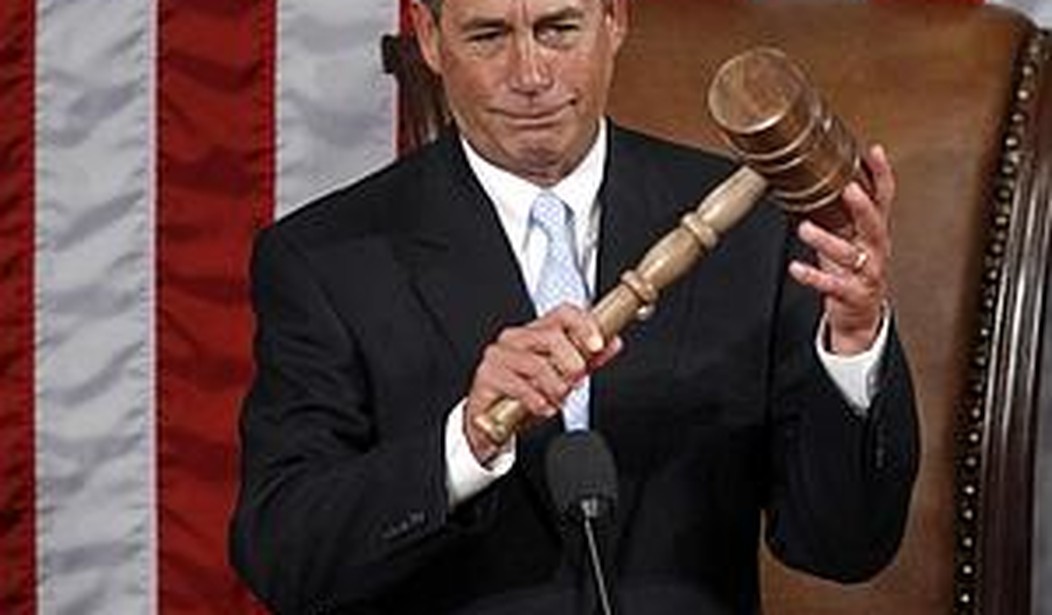WASHINGTON – Searching for legislation likely to attract consideration during the second session of the 113th Congress is like trying to find water in the Sahara – you know there’s an oasis out there somewhere but anything you think you see is likely just a mirage.
The first session of the 113th Congress generally is viewed as the least productive in the nation’s history. Lawmakers passed 65 bills – the lowest number since 1947, the year such statistics were first kept. The so-called “do-nothing” 80th Congress of 1947-48, which President Harry Truman campaigned against, produced 906 bills over a two-year period. The previous Congress, the 112th, passed 81 bills in its first year.
Many small-government Republicans, including House Speaker John Boehner, of Ohio, insist the lack of activity isn’t a bad thing. Boehner, in fact, said it’s more important that the voting public take heed of the legislation that didn’t pass.
“We should not be judged on how many new laws we create,” he said at one point in 2013. “We ought to be judged on how many laws we repeal.”
But that same public is fairly well convinced the 113th Congress has been awful. A CNN/ORC International poll released last week found that two-thirds of those surveyed considered the 113th to be, thus far, the worst ever. Almost 75 percent characterized it as a “do-nothing” Congress.
It’s hard to imagine how the second session will turn out to be much better than the first. The first session of a Congress is usually the most productive. In this instance the partisan divide remains wider than the sky. Complicating matters is the November election – many lawmakers will be looking to avoid controversial votes.
Regardless, the 113th Congress is going to have to pass – or at least consider — something to justify its existence. Here are 10 quick possibilities.
THE FARM BILL – Lawmakers wrangled over this for months during the first session and the issue should come to a head sometime early on. It’s considered a must for farm-state representatives since it provides subsidies for agricultural interests – there are fears that the price of milk could reach $7 or more per gallon if it’s not quickly addressed.
The problem is food stamps, a major provision in the bill. The House wants to slash the program by $39 billion. The Senate, controlled by Democrats, is willing to accept a modest $4 billion cut. The question will have to be resolved in conference.
UNEMPLOYMENT BENEFITS – Democrats had hoped to gain an extension of emergency benefits to the nation’s unemployed as part of the budget deal that passed both chambers before the Christmas recess. But Republicans, as represented by Rep. Paul Ryan of Wisconsin, chairman of the House Budget Committee, balked and the provision was left out of the deal.
As a result, about 1.3 million saw their unemployment insurance expire at the end of 2013, at a time when more than 7 percent of the nation’s workforce remains jobless. Democrats are unlikely to let the issue die and intend to use it to paint an ugly picture of the GOP in the fall elections. Boehner said he’s willing to consider an extension but the money for it will have to come from existing programs. Legislation has been introduced in both the House and Senate to extend the benefit at an estimated cost of $25 billion.
DEBT CEILING – Here we go again. Opposing sides are once again rushing toward a showdown over raising the nation’s debt ceiling, which essentially authorizes the Treasury to borrow the funds necessary to pay the nation’s bills.
Republicans are reluctant to raise the ceiling, arguing that it leads to more government spending and, therefore, more debt, forcing the ceiling to be raised yet again in the near future. Democrats maintain that without a necessary adjustment the U.S. will default on its obligations, sending world markets swirling into chaos. The hike doesn’t increase spending, it simply allows the nation’s bills to be paid.
The last face-off didn’t place the GOP in a good light. Boehner sought fiscal concessions from President Obama in return for raising the ceiling – starting with repeal of the Affordable Care Act, better known as Obamacare. The White House balked, insisting that lawmakers deliver a clean bill. Republicans finally acquiesced.
Treasury Secretary Jack Lew has informed Congress that the U.S. is likely to hit the debt ceiling once again sometime in late February or early March, igniting a firestorm once again. Ryan maintains Republicans expect to receive something in return – like approval of the Keystone XL pipeline pumping oil to the Gulf Coast from Canada.
KEYSTONE XL PIPELINE – As long as we’re on the subject, Republicans likely will try to force the administration to approve pipeline construction. Obama has been slow-walking the 1,661-mile, $7 billion project, voicing serious concerns about feared environmental consequences. Republicans counter the project will create an estimated 20,000 direct jobs – opponents claim the total is significantly less — and carry nearly a million additional barrels per day of secure Canadian oil supplies to U.S. refineries, from Hardisty, Alberta, Canada, to an area near the Texas Gulf Coast.
The House has voted at least seven times to proceed with construction – often with significant Democratic support. The issue has died in the Senate but support seems to be growing, perhaps initiating another effort.
IMMIGRATION – The issue is being watched because, among other things, it may prove to be Waterloo for the presidential hopes of Sen. Marco Rubio (R-Fla.). His support for a Senate measure has drawn disdain from Tea Party conservatives, perhaps leaving him in the station after the train takes off.
The Senate passed a highly publicized, sweeping measure last June that, among other things, provided the nation’s estimated 11 million undocumented immigrants with a path to citizenship. House Republicans balked and rejected the concept of one major bill. Instead, Rep. Bob Goodlatte (R-Va.), chairman of the House Judiciary Committee, is creating immigration legislation that will be broken into several component parts, each to be voted on individually.
Boehner has vowed to push the House version of immigration reform but it’s likely that whatever emerges will be a likeness to the Senate bill, meaning the lower chamber is unlikely to approve a path to citizenship. A difficult conference committee is in the offing.
NATIONAL SECURITY AGENCY – If there’s one area when the concerns of Democrats and Republicans might intersect it’s in the area of NSA surveillance, particularly in the area of retrieving domestic phone call records.
Sen. Patrick Leahy (D-Vt.), chairman of the Senate Judiciary Committee, is working with Rep. James Sensenbrenner (R-Wis.) to curtail the sweeping powers afforded the NSA in the USA Patriot Act, adopted in the wake of the 9/11 terrorist attacks.
Leahy said “sweeping government surveillance programs” that recently have drawn the public’s attention “threaten personal privacy and threaten the economic health of American technology companies.” The proposed legislation is intended to “end the dragnet collection of Americans’ phone records and recalibrate the government’s surveillance authorities. All three branches of government have now called into serious question the effectiveness of these authorities.”
VOTING RIGHTS ACT – The U.S. Supreme Court last June struck down a key component of the Voting Rights Act which required several states – mostly those in the South – to clear any changes in election laws with the Justice Department before proceeding.
The process was initially instituted to determine how any changes might affect minorities. Soon after the high court struck down the pre-clearance provision, North Carolina – one of the affected states – instituted new voting restrictions, which included the requirement of strict voter ID to cast a ballot, cuts to early voting and the elimination of same-day voter registration.
Citing the North Carolina action, and similar initiatives in other states, voting rights proponents are seeking to re-institute pre-clearance. A task force created by the Congressional Black Caucus drafted a set of recommendations but legislation has yet to emerge. House Republican Leader Eric Cantor, of Virginia, has publicly declared his desire to address the parts of the law the court found to be constitutional, but the House GOP leadership has yet to provide direction to the caucus.
EMPLOYMENT NON-DISCRIMINATION – Last November the Senate passed in bipartisan fashion the Employment Non-Discrimination Act, 20 years in the making, aimed at outlawing discrimination against lesbian, gay, bisexual and transgender individuals in the workplace.
The measure has a long way to go in the House. Boehner already has deemed the proposal unnecessary.
“The Speaker believes this legislation will increase frivolous litigation and cost American jobs, especially small-business jobs,” said Michael Steel, Boehner’s spokesman.
Regardless, proponents are expected to exert tremendous pressure in an effort to get the bill up for consideration. That’s unlikely unless a majority of the House GOP surprisingly offers support, bringing the so-called Hastert rule into play.
GUN CONTROL – The perennial issue is unlikely to cause much of a stir, but legislation is circulating to curb the “straw” purchasing of firearms where an individual purchases a gun for another individual who either is prohibited from owning a firearm or doesn’t want the purchase traced back to him or her.
Proponents, like Sen. Susan Collins (R-Maine), maintain straw purchasing and gun trafficking contribute significantly to the proliferation of guns throughout the nation across the southern border into Mexico. There currently is no criminal statute specifically prohibiting straw purchasing – prosecutors instead are forced to rely on laws that prohibit an individual from making false statements in connection with the purchase of a firearm. Those penalties, proponents maintain, are often too low or do not serve as effective tools for law enforcement.
The measure has thus far failed to gain the Republican support necessary to break a filibuster, which requires 60 votes. Even if that goal were achieved, it’s unlikely House Republicans would provide their endorsement. The same can be said for just about any pending gun-control legislation.
MINIMUM WAGE – Democrats are expected to make a major push to increase the $7.25 per hour minimum wage. Obama called for the increase in his 2012 State of the Union address but the entreaty was ignored by House Republicans.
But legislation that would raise the minimum wage to about $10, which polls well with both Democrat and Republican voters, may force the GOP hand. Democrats already are laying plans to make it a major congressional campaign issue if the GOP declines to consider it.
Increasing the minimum wage to $10 would place it at the level that existed in the 1960s and 1970s accounting for inflation. Republicans argue the jump will harm small businesses, but existing data is inconclusive.








Join the conversation as a VIP Member